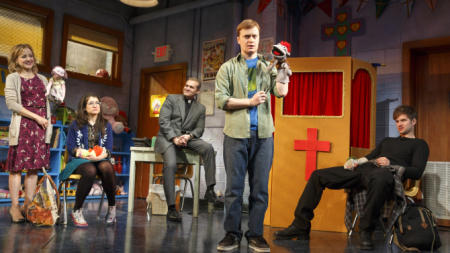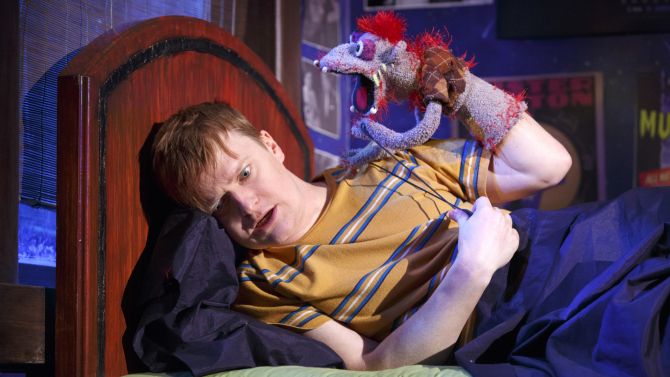 Dancin' Dan here for one of my favorite times of the year: TONY TIME! When the Tony nominations were announced, I had my usual reactions of shock and awe (congrats to all the supporting ladies from Fun Home, but did we really have to include all of them at the expense of their counterparts from On The Town?), but what made me happiest were the multiple nominations for Hand to God, hands-down the best play I’ve seen on Broadway in ages.
Dancin' Dan here for one of my favorite times of the year: TONY TIME! When the Tony nominations were announced, I had my usual reactions of shock and awe (congrats to all the supporting ladies from Fun Home, but did we really have to include all of them at the expense of their counterparts from On The Town?), but what made me happiest were the multiple nominations for Hand to God, hands-down the best play I’ve seen on Broadway in ages.
When you walk into the Booth Theater (most recently the home to Bradley Cooper’s Elephant Man), you’re immediately greeted with cheery posters extolling the beauty of the world and God’s hand in creating it, along with heavily southern-fried Christian country-rock. If you’ve ever been in a church school, the set will look freakily familiar… do all of these things look alike? But then the lights go down, and we’re greeted by… a sock puppet. This sock puppet’s name is Tyrone, and despite his adorable appearance, he has some not-so-adorable thoughts on his mind.

Giving the audience a brief history of good and evil, he ultimately blames Man for the creation of the devil, which was done in order to preserve one’s place in the tribe:
If I have done something bad, all I have to do to save myself is say, ‘The Devil made me do it!’”
And thus begins the scathing, hilarious new play Hand to God, as brilliant a new work of drama as the American theater has had to offer in many years. For those wondering, yes, it is as gleefully profane as the hilarious Avenue Q (currently still running Off Broadway, and very much worth the trip), but playwright Robert Askins also has a clear empathy for these characters - normal, messed-up human beings who have found themselves in a situation they’re unprepared for and ill-equipped to deal with. The play centers around a mother and son (the brilliant Tony-nominated duo Geneva Carr and Steven Boyer) who recently suffered the loss of their husband/father. Not having anywhere else to turn, mother Margery has found solace in the church, where she is leading a puppet workshop with the goal of putting on a performance for the congregation. Except that there are only three people, one of whom is a ne’er-do-well bad boy (Timothy, played by Michael Oberholtzer in a hilariously unhinged performance) only there because his mother is too drunk to take care of him, one of whom is a girl (Jessica, the unsung hero of the show played by scene-stealer and Tony nominee Sarah Stiles) who is really more into Balinese shadow puppetry, and one of whom is her son Jason, who despite his talent with his puppet Tyrone, is outwardly having a much tougher time dealing with the death of his father than his mother.
After some alone time with Jessica (Boyer performs a killer one-man version of the classic Abbott & Costello “Who’s on First” routine with Tyrone), his puppet starts speaking out of turn about how much Jason finds her attractive, and wants to do lewd things to her. Jason rips the puppet in two, but soon after finds Tyrone back on his hand, sewed together, this time with (possibly real) teeth in his mouth. Is Tyrone The Devil? Or is he just a manifestation of Jason’s inner id, able to say and do all the things Jason thinks about but can’t bring himself to do or say out loud himself? This is the central question of the plot, but Hand to God has more on its mind than just that.
Because, despite the marketing leading you to believe that this is a riotous combination of the adult puppetry of Avenue Q and the religious take-downs of Book of Mormon, Hand to God is far more interested in grief and family dynamics. Yes, the play largely takes place in a church, and yes, the play grapples with religion as an entity that can comfort and control people in ways that can be both helpful and ultimately harmful. But the setting is always secondary to the characters (except for one instance in the second act, when it is revealed that Tyrone has unleashed his inner interior decorator on the Church classroom to show-stoppingly hilarious effect - I wept when I saw that the delightfully-named Beowulf Boritt missed out on a Tony nomination for his perfect set design), and the brutal, powerful finale functions just as well as a metaphor for depression as it does as one for the battle with religion. The genius of the play lies in taking religion and the religious deeply seriously, and probing the gray, ambiguous areas to find just how much turning to the Church in times of crisis is healthy, or not. It asks tough questions, but it ends up being not nearly as controversial as you might think.
The other great genius of the play is the casting. It’s a pity Tony voters couldn’t find room for Marc Kudisch, who never condescends in his portrayal of Pastor Greg (despite how easily he could), or Oberholtzer, who is so believable as a rebellious, horny teen that it’s easy to forget that he is quite obviously much older. But there is no denying the brilliance of Carr, who so perfectly delineates all of Margery’s contradictory feelings and urges and creates not just a coherent character, but a person we know all too well from our own lives. And then there is the perfectly deadpan Stiles, who gets the play’s most quotable line (“You’re so far back in the closet you’re in Narnia.”) and is one-half of the play’s best, most raucous scene, in which her puppet Jolene seduces Tyrone, all while Jessica and Jason have a deep, very sweet heart-to-heart.

But all of these achievements pale in comparison to Boyer’s mind-blowing, genius-level work as Jason/Tyrone. It’s an incredible technical achievement, switching seamlessly between Jason’s quiet, recessive voice and Tyrone’s brash, foul-mouthed one. But more than that, the physical work is just beyond. Boyer makes you forget that Tyrone is only a sock, fully investing in him as a character, both part of and completely separate from Jason. He animates the puppet so well that you hardly notice that he’s also providing the voice. And on a second viewing, his performance only impressed more - even while trying to focus specifically on Boyer’s face, it’s near-impossible to not watch that damned sock puppet.
It’s tough to get inside Tony voters’ heads, and the Play categories are stacked this year, what with prestige British drama Wolf Hall, acclaimed (and frankly, mind-blowing) British import The Curious Incident of the Dog in the Night-Time, the Pulitzer Prize-winning Disgraced, and various acclaimed star turns all in the running. It remains to be seen whether Tony voters will go for this homegrown production (the play got its start in 2012 at Ensemble Studio Theater, and then played with MCC in 2014 at the Lucille Lortel), the most outre of the lot. I hope that those unable to look past the play’s surface profanity and sacrilege will at least be able to see the stellar, virtuoso work Boyer is doing here and award him the Tony. It would be great if the play (helmed with great care by Moritz von Stuelpnagel, who manages the tone of this pitch-black comedy perfectly) could ride his coattails to its own victory.
Related
Tony Nomination Discussion